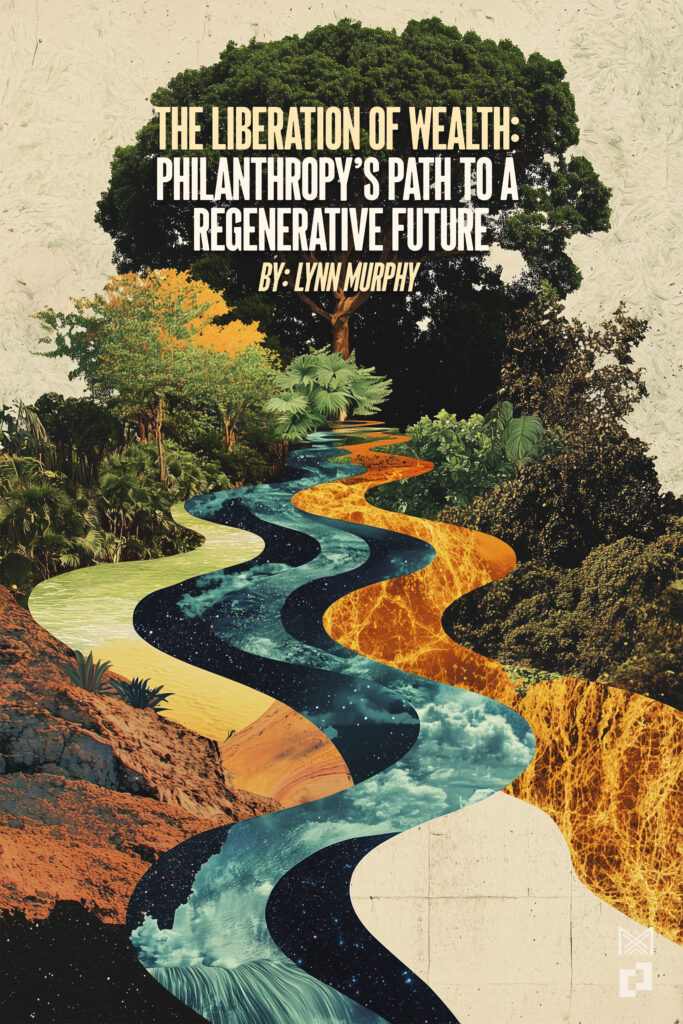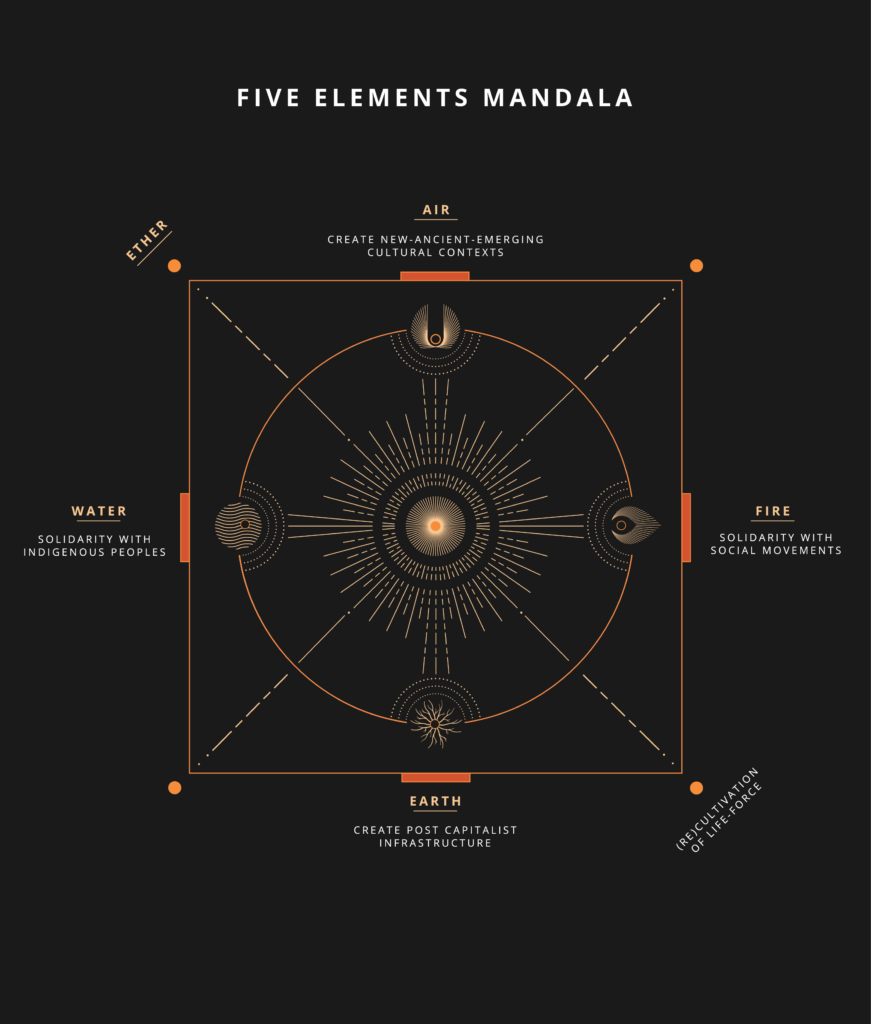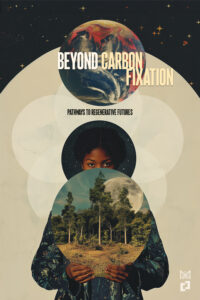The Liberation of Wealth: Philanthropy’s Path to a Regenerative Future
Philanthropy, by its very existence and ongoing practices, perpetuates late-stage capitalism. This piece considers whether there is a pathway for philanthropy towards transformative change and contribute to a regenerative future. It argues that philanthropy, as currently structured, fails to address root causes of inequity, climate change, or other dimensions of the metacrisis. True responses to the metacrisis and systemic change requires philanthropy to relinquish control, embrace degrowth economics, and actively dismantle harmful structures while embracing life-affirming efforts such as solidarity-based economies, redistributing wealth that serves all life, supporting the creation of bioregional sovereignty, supporting Indigenous and grassroots movements for justice, and to live in accordance with the sacred.

Whether we like it or not, with mounting crisis after crisis, we often turn towards philanthropy to lead, respond, and give money towards all that ails us. Yet philanthropy—in its current form, culture, logics, and self-preservation—is ill-equipped and woefully unfit to respond in ways that prioritizes the well-being of all people and the planet. It clings to capitalism, avoiding the ever-mounting signs that the world as we’ve known it in recent centuries is coming ever closer to the end. Not only is philanthropy born out of late-stage capitalism but it continues to uphold and benefit from this inequitable system that keeps us hurtling towards collapse.
This blatant contraction is inevitable. Philanthropy, by definition, is an externality of capitalism. Fortunes are made through exploitative practices that extract value from people and the broader ecology. Once wealth is amassed those who profited from social and ecological harm gain more status and legitimacy by setting up foundations to redistribute a portion of their wealth. While the bulk of the money remains locked in endowments, reinvested in ways that often perpetuate the very harm the foundation seeks to address, they decide where and how a small portion goes for so-called charitable purposes. Philanthropy, in this sense, functions as a salve for the inequities capitalism creates, without truly confronting the root causes and its historical and ongoing complicity.
Philanthropy, by definition, is an externality of capitalism. Fortunes are made through exploitative practices that extract value from people and the broader ecology.
While foundations may fund initiatives that aim to respond to the metacrisis, they rarely question the broader structure of the growth-debt-based paradigm, their own financial practices, or the ways they contribute to the metacrisis. An obvious example is how foundation endowments are often invested to yield high returns and those same investments contribute to greater inequities, further concentration of capital, and ongoing social and ecological destruction. A very small portion of those funds (around 5%) are then used to make grants to respond/reverse the damage and the cycle continues, by and large, without addressing the contradictions and complicity in their behavior.
More recently philanthropy has taken up several new agendas to respond in part to such glaring contradictions- e.g. new economy, carbon and biodiversity markets, indigenous rights, rights to nature, decolonizing wealth to name but a few. At their boldest, foundations aim to address the root causes of inequality, course correct, and contribute to a sustainable/regenerative economy. Concepts like participatory decision-making, solidarity economies, and just transitions represent real efforts to move beyond capitalism’s exploitative hand.
But until philanthropy sounds the alarm and simultaneously wakes up to its exploitative model (growing/preserving endowments, the toxic scarcity culture around funding, the concentration of power and control), it will perpetuate reformist responses and remain trapped within the very logic it claims to challenge. As the philosopher Bayo Akomolafe has observed, “Philanthropy is the equivalent of putting solar panels on a slave ship… Work towards justice gets us a seat at the table, but it doesn’t allow us to leave the house of capitalist modernity.”
As the philosopher Bayo Akomolafe has observed, “Philanthropy is the equivalent of putting solar panels on a slave ship… Work towards justice gets us a seat at the table, but it doesn’t allow us to leave the house of capitalist modernity.”
True systemic transformation of our current neoliberal economy—and its consequences— requires philanthropy to do more and do it better. It must address the historical and ongoing harm caused by capitalism, its colonial roots and on-going perpetuation of an anti-life, inequitable economic system. This cannot be done by tweaking the existing system or greenwashing; it requires building an entirely different operating system—one based on reciprocity, solidarity, and the interconnectedness of all life. One that requires moving the decision- making and resources to those most harmed by the dominant system and to organized social movements among the global majority. One that is willing to let go of its power and wealth in service to this broader mission, with an eye towards hospicing endowments and foundations, and perhaps neoliberal philanthropy itself. It requires philanthropy to understand that the outer world is a reflection of the inner condition and to find practices that support such new systems to be born and lived.
So where to start? More foundations could embrace degrowth economics and question the legitimacy of extreme wealth accumulation. Philanthropy can and should divest from perpetually growing endowments and relinquish control over which economic approaches are deemed legitimate to pursue. They could take on the challenge of redistributing resources not as charity, but as an act of reparations and reciprocity.
Philanthropy can and should divest from perpetually growing endowments and relinquish control over which economic approaches are deemed legitimate to pursue. They could take on the challenge of redistributing resources not as charity, but as an act of reparations and reciprocity.
In other words, we view the healing of and liberation of wealth itself as a transition pathway. We offer the five element mandala as a coordinate set of possibilities or transition pathways. Indigenous peoples represent the element of Water, the tributaries and veins of the planet, stewarding the world’s biodiversity. Social movements led by the global majority are the Fire element that forge the pathways towards life-centric alternatives through direct experience and place-based wisdom. The Air element is where new-ancient-emerging post capitalist cultures are re-imagining and reconstituting the oxygen (i.e. ideas and consciousness) we breathe. Building post-capitalist infrastructure are the Earth element, ensuring food, land, water, energy, medicine and cultural sovereignty at local and bioregional levels. The (re)cultivation of life -force is held in the element of Ether; addressing the roots of the trauma culture of capitalist modernity and centring our relationship with life and death.
Five Element Mandala

The report by Culture Hack Labs, The Pathways to Regeneration are Interwoven, offers a systems capability matrix that points to five regenerative pathways that link root causes to syntropic futures—futures where humans and nature flourish in harmony. These map with the five element mandala where restoring justice, restoring life sits within the fire and water elements of the mandala. We cannot move towards life-affirming systems without restoring right relationship with the Earth and each other. Moreover, we must address our anti-life, death-phobic culture to find our ways to restore justice and life. This is the work of practicing and living in solidarity with Indigenous peoples, of walking in solidarity with social movements calling for justice and right relationship with all of life, and the work of healing ourselves, our cultures, our institutions so we can come back into life-affirming ways of being and living. The earth elements of creating post capitalist infrastructure is where we see the work of bioregional community governance, economies of regeneration, and land for justice. To live transition pathways and affirm life, we see local, biocultural, and bioregional sovereignty as key to transitioning towards post capitalist realities. The work of healing spirit and healing earth comes in the ether element. As Francis Weller writes, we are currently inculcated into a culture of trauma and need to move towards cultures of initiation. We need to find our ways back into right relations with life force itself and move past our hyper-materialist, anti-life cultures. This allows us to find pathways toward healing—not to be better adjusted to the logics embedded within late-stage capitalism, but to live in accordance with the sacred, with the Earth, and with all our human and more-than-human relations.
The work of healing spirit and healing earth comes in the ether element. As Francis Weller writes, we are currently inculcated into a culture of trauma and need to move towards cultures of initiation.
To do this well requires acknowledging the inner-outer mirroring—-that we are part of/complicit in the metacrisis and we need commensurate shifts in culture and internal practices towards ethical, relational, solidarity, and humble approaches that honor the web of life. This requires interrogating biases and perceived limitations and embracing post- capitalist, life-centered economies. This process is not about incremental, reformist systems change—it’s about ongoing practice to ignite an alchemical state change, a total reimagining and embodying how we live and relate to one another and the living planet.
In short, philanthropy’s role in imagining and ushering in life-affirming systems is not tinkering within structures in the sinking ship but in taking part in the building of resilient vessels that can navigate the turbulent waters ahead. To do so, institutional philanthropy must return to the basics: rigorously question its worldview, unshackle itself from growth-debt-based capitalism, and commit to a vision of redistributing wealth that serves all life. Only then can we truly imagine—and create—what comes next.
Footnotes
- See https://www.postcapitalistphilanthropy.org/ for more on Post Capitalist Philanthropy: Healing Wealth in Times of Collapse
